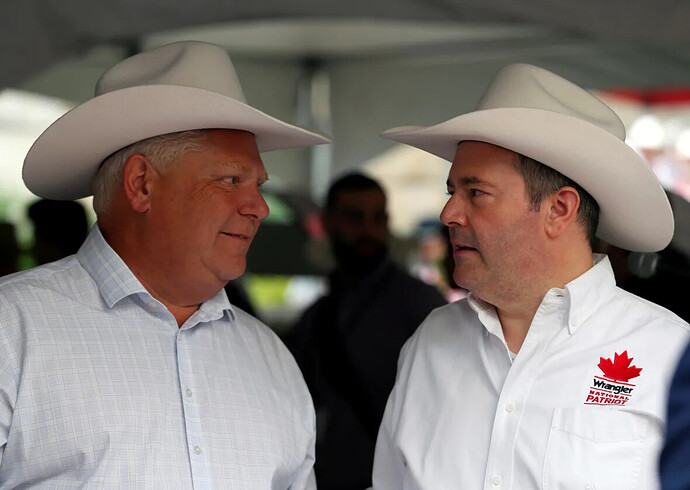Totally irrelevant, the Conservatives had a vote and determined that climate change isn’t real. OPEN FOR BUSINESS OILSANDS GO BRRRRRRRRR!!!
Interesting pic from the article. Seems that Canadian politicians cosplay as rural working people just like in the USA.
@clovis8 I know you work in the environmental sector, what is your take on the actual law/regulations and its potential impact towards climate change, and as a part of the overall strategy to deal with it? The article was more focused on the court ruling and the constitutionality rather than the policy impact.
That is a complex question. High level regulation is the only solution. In detail some regulations work really well while other are terrible and even incentivize the very thing they are trying to prevent.
Overall carbon credits have to be a part of any logical climate policy.
As for the photo, I think that is at the Calgary stampede. Sadly, we all cosplay that week myself included.
Do you happen to know or have an opinion as to where on the spectrum between [working well]<----->[terrible] this particular carbon tax lands?
If I’m ever up in Calgary for the Stampede I’ll be on the look out for:

Terrific. Now do leather and latex. Or sexy nurse.
lol the photoshops. I give skills a D but intent an A-!
As for how good our carbon credit system is, I think it’s world class. It has a few loopholes I don’t like but it highly incentives good corporate behaviour.
When I was in college I always tried to “work the refs” for a better grade, but I cannot disagree with the grades you’ve assigned for my photoshops prof clovis. 
Carbon credits are a terrible idea. Carbon taxes are the best solution to climate change full stop. It’s not really all that hard to do either. You just tax inputs super hard which incentivizes everyone to figure out the lowest carbon way to do every single transaction in capitalism, and in some cases to reevaluate whether that transaction makes any sense at all. It’s also very hard to avoid because you’re basically just taxing the living daylights out of fossil fuel sales.
If we put in a 200 dollar a ton carbon tax carbon emissions would fall by an almost impossibly large amount.
The way you deal with this raising prices (although not by as much as you would think) for consumers is by distributing the revenue raised on a weekly per capita basis. This takes out most of the pain for the middle class, and since the poor have very small carbon footprints they should see a small to medium sized net gain from this.
Trying to raise revenues through carbon taxes is bad. The government shouldn’t be trying to retain any of this money. The insulation, efficient heating systems, and renewables go in because people want to avoid paying expensive taxes. The taxes then go right back out the door to everyone which makes it possible to make these taxes MUCH larger than they ever could be normally, and gives them tons of political cover as the poor and lower middle class should see a decent sized profit.
we can certainly debate whether or not carbon credits are a market solution where regulations need to just step in, but at least in theory carbon credits are just a cash instrument, rather than a tax instrument, for funding most obvious carbon sequester projects, e.g. reforestation and kelp farming.
like, it’s not effective for small/medium biz X to start investing into various unproven products to offset their emissions immediately, even if they are ready to pay for someone else to figure it out. there was a good podcast “how to save a planet” on carbon credits. Basically overnight, credits became a lifeline for indigenous tribes doing conservation. you can see it working in areas where cash-crop is declining as well, e.g. if just storing carbon pays better than growing corn for no particular reason other than subsidies.
solution you describe has some pretty good pull from notable economists, but politically it’s a much tougher sell. from my limited pov, the solution also lacks immediate investment/payment into solutions, it just sends everyone in search of something that fits the requirement. Although even that problem can be offset by a portion of the taxes not going back per capita, but being diverted towards carbon negative things.
Is it better from a environmental perspective to drive my 2009 Civic until it quits or replace it with an EV?
It’s got 105k miles on it. I only drive about 5k miles a year pretty much highway only.
Given you have a pretty efficient car and don’t drive much it’s a close call CO2 wise.
An EV manufacture is responsible for about 15k kg of CO2. If you charge from the grid, you’re going to save about .3 kg CO2/mile. So, like 10 years CO2 payback. Very rough estimate and there are other factors of course.
Not pushing a viewpoint, but would like to share an experience.
When i studied economics in undergrad, all the debates were “which is better. Carbon tax, Carbon credits, or regulatios?” And it was very theoretical.
Revisiting this now in my energy masters. With nearly 20 years or practical implimentations to look at. Its now basically everyone saying “lol theory. Who cares. Its all about political feasibility”
Which is why we are all spending so much around the world for middle class reliable voters to improve the value of their houses…
Somehow I find it more and more diffcult to combine a healthy lifestyle with an environmentally friendly one.
Let’s eat less red meat. The Italian diet is supposed to be good. But it consists of a lot of fish as well. Unfortunately we are fishing the oceans to the brink of collapse. Ok chicken then. The supply of organic chicken is limited or I have to learn to buy the whole chicken and somehow use it all. I try to avoid turkey because they are bred unnaturally. The big breasts make for a shitty living. Is organic turkey something different?
Next: fruits. Berries are good. Unfortunately most of the are packed in plastic. The recent John Oliver episode didnt help. Its rare that they have raspberries or blueberries packed just in carton. Blackberries I only see in plastic.
Apples are good and can be bought in carton. Bananas as well.
Vegetables: organic tomatoes and bell pepper mostly packed in plastic as well as broccoli.
The alternative would be frozen fruits and veggies which can be had in carton.
My dad said he saw a documentary which basically said that veggies and fruits from overseas arent worse off environmentally than local stuff. Because they need cold storage to keep the local stuff viable throughout the year.
There would still be the question what is better: fresh stuff packed in plastic or frozen stuff in carton.
First thing is that it really doesn’t matter what you individually do, it’s not going to make any difference.
Why do you want “organic chicken”? Free range I get. I presume it’s illegal to give chickens hormones in your jurisdiction. I think it is in most jurisdictions worldwide.
A lot of the sustainable fish choices - Pacific sardines, mackerel, salmon - are also fatty fishes which are nutritionally what you want to go for. You can also get sustainable white fishes such as farmed barramundi.
Doesnt organic mean no antibiotics just for fun etc… giving them food that is also organic?
If you can afford it, the most environmentally responsible way to eat is to eat locally and eat seasonally. Basically act like you’re living in the 19th century. If it was grown/raised/produced in some far away industrial process you’re likely trading convenience and lower cost for negative environmental externalities.
Canadians might not enjoy living like Russian peasants half the year.

